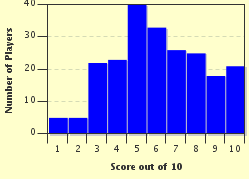Quiz Answer Key and Fun Facts
1. American author John Steinbeck used phrases from other works for his own titles. Which of these choices is NOT correctly matched to its source?
2. Aldous Huxley's "Brave New World" is taken from which Shakespeare play?
3. George Bernard Shaw's "Arms and the Man" is taken from which work?
4. The novel titles "Things Fall Apart" and "The Center Cannot Hold" were taken from which work?
5. "Ulysses", allegedly by the Greek poet Homer, was used as a title by which author?
6. Robert Heinlein's novel, "Stranger In A Strange Land", comes from which source?
7. The disturbing short novel, "Lord Of The Flies", used which source for its title?
8. William Faulkner's "The Sound and The Fury" takes its title from which work?
9. Hemingway's 1940 novel title, "For Whom The Bell Tolls", is taken from which work?
10. "Catcher In The Rye" took its title from where?
Source: Author
alexis722
This quiz was reviewed by FunTrivia editor
MotherGoose before going online.
Any errors found in FunTrivia content are routinely corrected through our feedback system.

